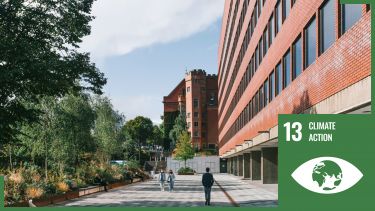SDG13: Climate Action
The University is committed to tackling climate change through research, policy and partnerships.

Climate change is the most devastating and disastrous threat to our planet, and action needs to be taken now to mitigate its impacts. The future of our planet hangs in the balance of how we act, manage and adapt to climate change, with education and research at the forefront of everything we do.
Key facts for how we are achieving SDG13
- Aim to be one of the most sustainable research-intensive universities in the country and reach net-zero carbon emissions in all activities by 2038 (Scope 1,2 and 3)
- Net-zero on campus by 2030 (Scopes 1 and 2)
- Reduce Scope 3 absolute carbon emissions by 30 percent by 2025 and 75 percent by 2030* (Based on a 2018/19 baseline)
- 100% of purchased electricity used in research, teaching and administrative buildings is from solar, wind or hydroelectric power
- Updated Business Travel Policy to place sustainability at the heart of travel decision-making
- The University of Sheffield holds no shares in any companies involved in the extraction of fossil fuels
Research
Ice and Glacier Research
The Ice and ClimatE Research at Sheffield (ICERS) Group investigates how climate change will affect mountain glaciers and sea ice sheets around the world. They also look into how changes to glaciers and sea ice will impact the rest of the world, from how smaller icebergs breaking off melting sea ice would present a challenge for shipping to what landscapes that feature glaciers might look like as that ice melts.
Food Security
Researchers at The University’s Institute for Sustainable Food have come up with a way to create self-supporting miniature farms inside old shipping containers. The farms are small enough that small areas of unused land in cities can be utilised, providing a local food supply. The farms rely on an aquaponic system that uses fish instead of fertilisers to grow plants in water, and uses 10% of the water used in conventional agriculture making them a resilient option for food production even as climate change affects contemporary farming methods.
Modifying rail cars could mitigate climate change
Researchers from The University of Sheffield are working with US-based startup CO2Rail Company to help mitigate climate change and remove CO2 in the atmosphere, by capturing sustainable energy generated when trains break and decelerate. Researchers have identified that the energy used at every stop or deceleration for every train in the world could be captured; it would harness 105 times more energy than the Hoover Dam produces in the same time period. On average, braking manoeuvres generate enough energy to power 20 average homes for an entire day.
Campus
Carbon neutrality
University of Sheffield carbon neutrality targets are based on analysis by the Tyndall Centre for Climate Change. The primary approach of the decarbonisation strategy is to reduce the University’s absolute carbon emissions by switching away from fossil fuels and towards energy-efficient technologies where possible. Research is also underway into the most effective ways to offset carbon emissions, with a particular focus on developing methods that could be applied in a range of contexts to offer the greatest possible societal benefit.
Divestment
In 2019, the University of Sheffield fully divested from all shares in fossil fuel companies. The University’s endowment investment policy seeks to eliminate exposure to explicit environmental damage by excluding companies that are classified as oil and gas producers (exploration for, drilling, production, refining, supply, distribution, retail sales) or those that supply oil equipment, services or distribution. It also also seeks to eliminate exposure to companies involved in armaments, tobacco, and non-pharmaceutical products that are being tested on animals for cosmetic or other non-medical purposes.
At COP26 in November 2021, the University reaffirmed this commitment by becoming a founder signatory of a new declaration of climate expectations, which sets out the minimum climate commitments it expects from the companies managing its investments.
Partnerships
Grantham Centre
The Grantham Centre for Sustainable Futures is a collaboration between the University of Sheffield and the Grantham Foundation for the Protection of the Environment. PhD researchers working on sustainability-related topics can become Grantham Scholars to receive specialised training in sustainability and environmental leadership and advocacy. The UN’s Sustainable Development Goals (SDG) are the fundamental basis of the Grantham Centre’s research to create a sustainable future for all.
Leverhulme Centre for Climate Change Mitigation
Leverhulme Centre for Climate Change Mitigation (LC3M) is harnessing world-class expertise at the University of Sheffield, alongside UK and international leading collaborators to research ways in which CO2 can be removed from the atmosphere. A £4.7 million investment was given to LC3M from the government to research the use of enhanced mineral weathering, or amending soils with crushed calcium and magnesium rich silicate rocks to accelerate natural CO2 capture processes. This method will also improve the fertility of UK agricultural crops and decarbonising the food system.
#MadeAtUni #ClimateAction
Universities UK is leading #MadeAtUni #ClimateAction, a campaign to demonstrate the wide range of ways UK universities are tackling climate change. The University of Sheffield’s partnership with ITM power to develop a green hydrogen gigafactory and hydrogen training centre in South Yorkshire is included in the campaign, helping to highlight the changes being driven by the University. The #MadeAtUni #ClimateAction campaign is helping to educate students and the general public about how universities are equipping industry and society to tackle climate change.
